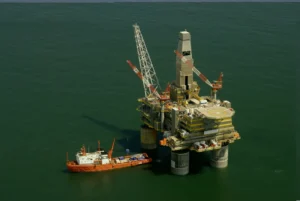The African Energy Chamber (AEC) has has said that the African upstream sector is set for a dynamic year in 2026 as mergers and acquisitions (M&A) continue to reshape the continent’s energy landscape.
According to the African Energy Chamber’s State of African Energy 2026 Outlook, African M&A activity is being driven by strategic realignments among global independents, international oil companies and indigenous operators, alongside a wave of licensing rounds offering new opportunities across both mature and frontier basins.
These developments will be a major focus at next year’s African Energy Week (AEW) conference, where stakeholders are expected to explore how corporate transactions and licensing strategies are redefining Africa’s upstream sector.
Globally, upstream M&A totaled $51 billion in the first half of 2025, marking a decline from the second half of 2024.
Market volatility, financial uncertainty and U.S. trade measures have prompted companies to adopt a more cautious approach, with deal-making concentrated in North America declining significantly.
Internationally, deal volumes increased slightly but remained below historical norms, with corporate combinations driving transaction values while standalone asset sales slowed. Upstream firms are increasingly prioritizing capital returns to shareholders, focusing on bolt-on deals, joint exploration and development within their core regions.
In Africa, the M&A landscape is evolving rapidly. Global independent oil companies are divesting mature assets, creating space for local and regional players to expand.
Over the past decade, Nigerian independents – including Seplat, Oando, First E&P, Amni, Conoil, Newcross, Aiteo, Neconde and Shoreline – have leveraged auctions and company acquisitions to build significant portfolios. The trend continued in 2024 and early 2025, with several high-profile divestments reshaping Nigeria’s upstream sector. Notable transactions include ExxonMobil’s sale of a 30% operated interest in Mobil Producing Nigeria Unlimited to Seplat Energy, Eni’s transfer of its onshore E&P subsidiary to Oando, and the divestment of TotalEnergies and Equinor ASA’s Nigerian assets to Chappal Energies Offshore.
March 2025 marked another milestone with Shell’s sale of its subsidiary, Shell Petroleum Development Company of Nigeria Ltd, to Renaissance – a consortium of five mostly indigenous Nigerian E&P companies. These deals highlight the growing role of local operators in onshore activities, while international players maintain a strategic presence in deepwater fields. Shell’s FID for the Bonga North deepwater project underscores renewed investor confidence, supported by Nigeria’s Petroleum Industry Act and streamlined divestment approvals.
Elsewhere in Africa, international trading companies are also reshaping portfolios. Vitol’s $1.65 billion acquisition of Eni assets in Ivory Coast and the Republic of Congo strengthens its African footprint while securing LNG supply and trading synergies. Eni’s divestitures, part of a dual exploration model, retain operatorship while monetizing minority stakes to fund energy transition initiatives.
Similarly, Shell’s acquisition of TotalEnergies’ 12.5 per cent stake in Nigeria’s Bonga field for $510 million reflects a focus on high-return projects and supports its global production targets.
Licensing rounds across Africa are further fueling the M&A pipeline. Despite delays in Angola, Congo, Sierra Leone and Tanzania, early 2025 saw significant activity in Algeria and Libya. Algeria’s first bid round in a decade awarded five of six blocks, offering both new production sharing terms and improved royalty/tax arrangements. Libya’s first licensing round in 17 years, covering 22 blocks, introduced revised fiscal terms designed to attract investment. These developments signal a continued trend towards investor-friendly contracts across the continent, creating opportunities for both frontier and mature producers.
“The African oil and gas sector is set for significant consolidation in 2026, particularly among midsize and African independent companies. This trend is driven by a desire for a more efficient and competitive environment, which is ultimately beneficial for both the continent and the industry in the long term,” says NJ Ayuk, Executive Chairman of the African Energy Chamber.
He adds that while cash remains the primary currency for most deals in Africa, an interesting development is the increasing use of stock-for-stock swaps.
“The current climate in African oil and gas can be characterized by an ‘eat or be eaten’ mentality, with many companies prepared to be aggressive and opportunistic in 2026 as momentum builds,” notes Ayuk.
AEW 2026, set to convene industry leaders, policymakers and investors, will serve as a critical forum for discussing these M&A and licensing trends. Delegates can expect in-depth sessions on the strategic implications of asset divestments, the rise of indigenous operators and the impact of evolving licensing frameworks. With Africa’s upstream sector attracting increasing interest from international investors and regional players, AEW 2026 is positioned to highlight the continent’s growing role in global energy markets and the opportunities emerging from ongoing corporate realignments.





